
FACULTY OF ARTS AND SCIENCES
Department of Sociology
SOC 435 | Course Introduction and Application Information
| Course Name |
Everyday Life and Sociology
|
|
Code
|
Semester
|
Theory
(hour/week) |
Application/Lab
(hour/week) |
Local Credits
|
ECTS
|
|
SOC 435
|
Fall/Spring
|
3
|
0
|
3
|
6
|
| Prerequisites |
None
|
|||||
| Course Language |
English
|
|||||
| Course Type |
Service Course
|
|||||
| Course Level |
First Cycle
|
|||||
| Mode of Delivery | - | |||||
| Teaching Methods and Techniques of the Course | - | |||||
| Course Coordinator | - | |||||
| Course Lecturer(s) | ||||||
| Assistant(s) | - | |||||
| Course Objectives | The course aims to introduce to sociological thinking by examining certain topics and debates in the study of everyday life. |
| Learning Outcomes |
The students who succeeded in this course;
|
| Course Description | The course is designed to make students familiar with sogiological thinking through the discussions of everyday experiences. With an emphasis on the relationship between individual and society it aims to create an awereness about the “sociological imagination”. To do this, main sociological topics such as society, individual, identities, power, Urban/public space, intimacy, house, consumption, work, leisure, humour and inequalities in everyday life, will be discussed to explore the relationship between individual biography and social history. |
|
|
Core Courses | |
| Major Area Courses | ||
| Supportive Courses |
X
|
|
| Media and Management Skills Courses | ||
| Transferable Skill Courses |
WEEKLY SUBJECTS AND RELATED PREPARATION STUDIES
| Week | Subjects | Related Preparation |
| 1 | Presentation and overview of the course | C. Wright Mills, "The Promise of Sociology" Sociological Imagination |
| 2 | Thinking Sociologically and Everyday Life | Susie Scott, Making Sense of Everyday Life, Chapter 2 |
| 3 | New Sociologies of Everyday Life | Susie Scott, Making Sense of Everyday Life, Chapter 2; Sigmund Freud, Parapraxes, Ego Defence Mechanisms, Erving Goffman, The Presentation of Self in Everyday Life (ELR) |
| 4 | Everydayness of Inequality: Class, Gender | Anthony Giddens, Sociology; 3rd edition, Polity Press, 1998, chapter10, pp. 239-282. & chapter 5, pp. 89-113. |
| 5 | Everydayness of Inequality: Gender, Ethnicity | Anthony Giddens, Sociology; 3rd edition, Polity Press, 1998, chapter 9, pp. 209-238. |
| 6 | Violence and everyday life | Film screening |
| 7 | In-Class Writing | |
| 8 | Emotions, Love and Friendship | Susie Scott, Making Sense of Everyday Life Chapter 3 |
| 9 | Houses and Rooms | Susie Scott, Making Sense of Everyday Life Chapter 4 |
| 10 | Eating and Drinking | Susie Scott, Making Sense of Everyday Life Chapter 6 |
| 11 | Mid-term Exam | |
| 12 | Consumption and Shopping | Susie Scott, Making Sense of Everyday Life Chapter 8 |
| 13 | Work, Leisure and Boredom | Susie Scott, Making Sense of Everyday Life Chapter 9 |
| 14 | Humour and Resistance | Giselinde Kuipers, Good humor, bad taste: a sociology of the joke |
| 15 | Overview of the Course | |
| 16 | Final exam |
| Course Notes/Textbooks | Making Sense of Everyday Life, Susie Scott, Polity Press, 2009. Everyday Life Reader, ed.by Ben Highmore, Routledge, 2002 |
| Suggested Readings/Materials | Additional readings may be assigned during the semester. |
EVALUATION SYSTEM
| Semester Activities | Number | Weigthing |
| Participation |
1
|
10
|
| Laboratory / Application | ||
| Field Work | ||
| Quizzes / Studio Critiques |
1
|
20
|
| Portfolio | ||
| Homework / Assignments | ||
| Presentation / Jury |
1
|
15
|
| Project | ||
| Seminar / Workshop | ||
| Oral Exams | ||
| Midterm |
1
|
25
|
| Final Exam |
1
|
30
|
| Total |
| Weighting of Semester Activities on the Final Grade |
65
|
|
| Weighting of End-of-Semester Activities on the Final Grade |
35
|
|
| Total |
ECTS / WORKLOAD TABLE
| Semester Activities | Number | Duration (Hours) | Workload |
|---|---|---|---|
| Theoretical Course Hours (Including exam week: 16 x total hours) |
16
|
3
|
48
|
| Laboratory / Application Hours (Including exam week: '.16.' x total hours) |
16
|
0
|
|
| Study Hours Out of Class |
16
|
4
|
64
|
| Field Work |
0
|
||
| Quizzes / Studio Critiques |
1
|
10
|
10
|
| Portfolio |
0
|
||
| Homework / Assignments |
0
|
||
| Presentation / Jury |
1
|
10
|
10
|
| Project |
0
|
||
| Seminar / Workshop |
0
|
||
| Oral Exam |
0
|
||
| Midterms |
1
|
13
|
13
|
| Final Exam |
1
|
20
|
20
|
| Total |
165
|
COURSE LEARNING OUTCOMES AND PROGRAM QUALIFICATIONS RELATIONSHIP
|
#
|
Program Competencies/Outcomes |
* Contribution Level
|
||||
|
1
|
2
|
3
|
4
|
5
|
||
| 1 | To have the knowledge of classical and contemporary theories in sociology, and be able to comparatively analyze these theories. |
X | ||||
| 2 | To have the knowledge of main methodological approaches in sociology as well as social research and data analysis methods. |
X | ||||
| 3 | To have knowledge in the fields of general sociology, sociology of institutions, social structure and change, and applied sociology. |
X | ||||
| 4 | To be able to determine the appropriate methods in the design of the planning stage and conclusion of a sociological project, individually or as part of a team. |
X | ||||
| 5 | To be able to diagnose the social dynamics behind personal problems by using sociological imagination. |
X | ||||
| 6 | To be able to define social problems at local, national, and global level, and offer new policies for solutions. |
X | ||||
| 7 | To be able to apply commonly-used computer programs for data collection and analysis in sociological research. |
|||||
| 8 | To be able to develop a socially responsible, scientific and ethical perspective regarding the collection, analysis, interpretation and presentation of data. |
X | ||||
| 9 | To be able to analyze different aspects of the social world by drawing on the knowledge produced by other disciplines of the social sciences. |
X | ||||
| 10 | To be able to constantly renew herself/himself professionally by following scientific and technological developments in sociology and social research. |
X | ||||
| 11 | To be able to collect sociological data and communicate with sociologists and other social scientists in a foreign language ("European Language Portfolio Global Scale", Level B1). |
X | ||||
| 12 | To be able to speak a second foreign at a medium level of fluency efficiently. |
|||||
| 13 | To be able to relate the knowledge accumulated throughout the human history to their field of expertise. |
X | ||||
*1 Lowest, 2 Low, 3 Average, 4 High, 5 Highest
NEWS |ALL NEWS
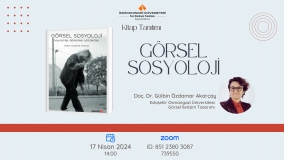
Book Presentation and Talk: Visual Sociology
Department of Sociology invites you to the Book Presentation and Talk event with Gülbin Özdamar Akarçay, the author of “Visual Sociology". Date:
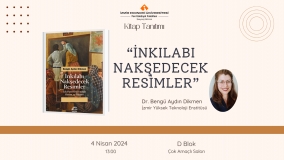
Book Presentation and Talk: Painting the Revolution
Department of Sociology invites you to the Book Presentation and Talk event with Dr. Bengü Aydın Dikmen, the author of “Painting the
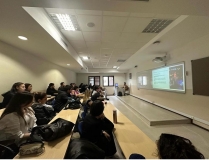
We welcomed ethnomusicologist Onur Sönmez.
We held our sociology seminar where we hosted ethnomusicologist Onur Sönmez. We thank him very much for this detailed and interesting presentation.
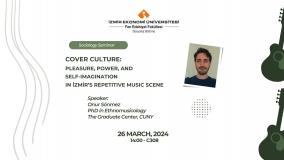
Cover Culture: Pleasure, Power, and Self-Imagination in İzmir’s Repetitive Music Scene
You are cordially invited to the Sociology Seminar where we will host Dr. Onur Sönmez. Onur Sönmez has a PhD in ethnomusicology
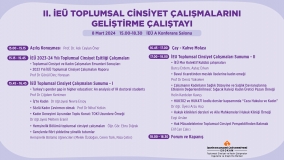
II. IUE GENDER STUDIES DEVELOPMENT WORKSHOP (EKOKAM- Gender and Women’s Studies Research and Application Center)
Research Assistant Helin Kardelen Kavuş attended the “II. IUE Gender Studies Development Workshop” on March 8, 2024, International Women's Day. Organized by EKOKAM, the workshop
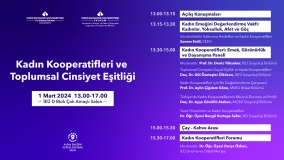
Women’s Cooperatives and Gender Equality
You are cordially invited to "Women's Cooperatives and Gender Equality", which will be co-organized by IUE EKOKAM, the Department of Sociology, and
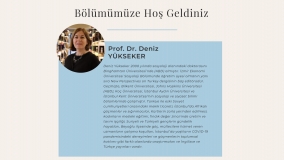
Welcoming Our New Faculty Member: Professor Deniz Yükseker
We are proud to welcome and introduce our newest faculty member: Professor Deniz Yükseker. We wish her all the best and success
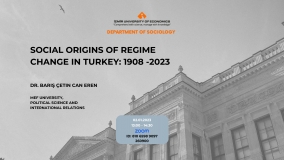
Sociology Seminar: Social Origins of Regime Change in Turkey: 1908 -2023
Department of Sociology cordially invites you to a seminar on "Social Origins of Regime Change in Turkey: 1908 - 2023" by Dr.



